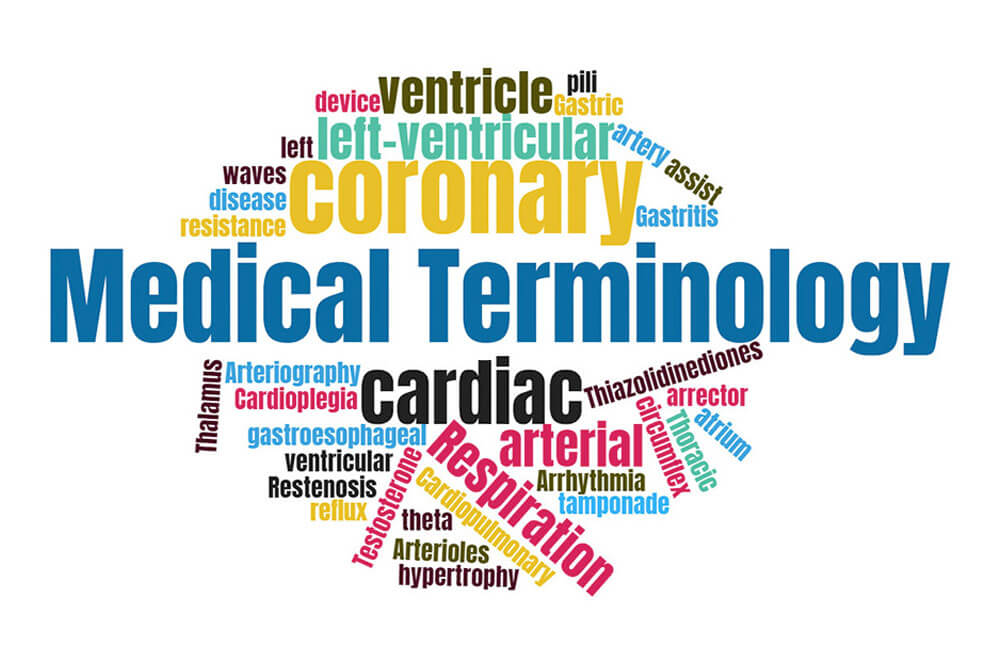- CNA Programs by State
- Alabama
- Alaska
- Arizona
- Arkansas
- California
- Colorado
- Connecticut
- Delaware
- Florida
- Georgia
- Hawaii
- Idaho
- Illinois
- Indiana
- Iowa
- Kansas
- Kentucky
- Louisiana
- Maine
- Maryland
- Massachusetts
- Michigan
- Minnesota
- Mississippi
- Missouri
- Montana
- Nebraska
- Nevada
- New Hampshire
- New Jersey
- New Mexico
- New York
- North Carolina
- North Dakota
- Ohio
- Oklahoma
- Oregon
- Pennsylvania
- Rhode Island
- South Carolina
- South Dakota
- Tennessee
- Texas
- Utah
- Vermont
- Virginia
- Washington
- West Virginia
- Wisconsin
- Wyoming
- Online CNA Programs
- CNA Bridge Programs
- Blog
- Search Programs

Are you preparing to begin a CNA training program? Would you like to get a head start on your medical terminology coursework? As a certified nursing assistant, there are many medical terms and abbreviations you will need to learn before you can obtain employment. While the list of this terminology is a bit lengthy, some of the most important terms and abbreviations you will need to know can be found below.
Table of Contents[hide]
Common Medical Roots
CNA medical terminology can be quite confusing to the average person. However, when you understand the root meanings of these words, you will find that learning medical terms is actually very simple. For example, words that contain the root dermat deal with skin. Other common roots and their meanings are as follows:
- Cardio and Corono - Heart
- Encephao and Cerebro - Brain
- Cranio - Skull
- Dermato - Skin
- Vasculo - Blood Vessels
- Phlebo and Veno - Veins
- Neuro - Nerves
- Colo - Colon
- Osteo - Bones
- Oto - Ears
- Pneumo - Lungs
- Reno and Nephro - Kidneys
- Thoraco - Chest
Important Medical Terms
The above roots can help you learn many of the medical terms you will need to know while working as a CNA. However there is a vast array of other medical terms you will encounter during your career, and some of the more common ones are listed below. Keep in mind that this is just a sample, and you will learn many more terms during your CNA training.
- Ambulate - To Move from One Place to Another
- Aphasia - Inability to Speak or Understand Speech
- Angina - Chest Pain
- Anterior - Front of the Body
- Lateral - Side of the Body
- Posterior - Back of the Body
- Proximal - Center of the Body
- Aspirate - To Suck In
- Aseptic - Preventing Infection
- Atrophy - Progressive Decline
- Contracture - Shortening of a Joint or Muscle
- Cyanosis - Blue Coloration of the Skin or Mucous Membranes
- Debacutis - Bed Sores, Lesions or Ulcers
- Dysphagia - Difficulty Swallowing
- Dypsnea - Shortness of Breath
- Edema - Significant Swelling
- Emesis - Vomit
- Incontinent - Inability to Control Bladder or Bowels
- Logrolling - Rolling Patients to the Side
- Micturition - Urinating
- Prosthesis - Artificial Limb or Other Body Part
- Prone Position - Lying on the Belly
- Supine Position - Lying Face-Up
- Trendelenburg Position - Lying Face-Up With Feet Elevated
- Purulent - Relating to Pus
- Serous - Thin and Watery
Essential Medical Abbreviations
In addition to the many medical terms you will need to learn during your nurse assistant training, you will also need to learn a variety of medical abbreviations. Your work order sheets will typically contain many abbreviations that will dictate your daily tasks. Although this list is also quite extensive, some of the most essential abbreviations you must be aware of include:
- AC - Before Meals
- AMB - Ambulate
- BID - Twice Per Day
- BM - Bowel Movement
- BP - Blood Pressure
- Cl Liq - Clear Liquids
- C/O - Complains Of
- DC - Discontinue
- FBS - Fasting Blood Sugar
- FF - Force Fluids
- HOB - Head of Bed
- I&O - Intake and Output
- NPO - Nothing By Mouth
- N&V - Nausea and Vomiting
- OOB - Out of Bed
- PC - After Meals
- PO - By Mouth
- PRN - As Necessary
- QD - Every Day
- QH - Every Hour
- QID - Four Times Per Day
- ROM - Range of Motion
- SOB - Shortness of Breath
- TID - Three Times Per Day
- TX - Treatment
- VS - Vital Signs
- W/C - Wheelchair
Conclusion
As a CNA student, you will need to learn a large variety of medical terminology and abbreviations. However, understanding root meanings can make the process easier.



